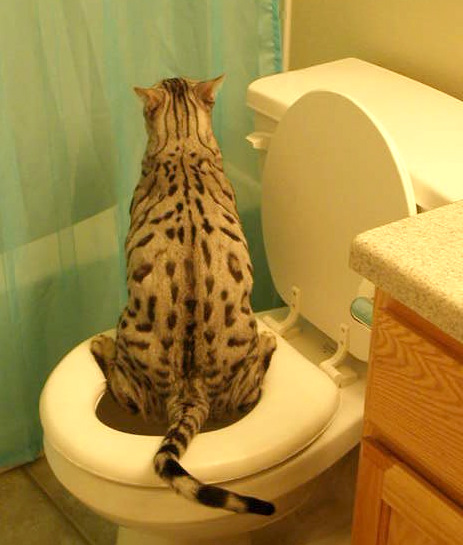Potential Issues of Flushing Cat Poop Down Your Toilet - Safeguard Your Pipes
Potential Issues of Flushing Cat Poop Down Your Toilet - Safeguard Your Pipes
Blog Article
What are your thoughts on Can You Flush Cat Poop Down The Toilet??

Introduction
As cat proprietors, it's vital to be mindful of exactly how we dispose of our feline close friends' waste. While it might seem hassle-free to purge cat poop down the commode, this method can have detrimental consequences for both the setting and human health and wellness.
Alternatives to Flushing
Thankfully, there are much safer and much more responsible means to get rid of feline poop. Think about the complying with alternatives:
1. Scoop and Dispose in Trash
One of the most common technique of dealing with pet cat poop is to scoop it into a naturally degradable bag and throw it in the trash. Make certain to utilize a committed litter inside story and deal with the waste without delay.
2. Use Biodegradable Litter
Opt for naturally degradable cat trash made from products such as corn or wheat. These litters are eco-friendly and can be securely gotten rid of in the garbage.
3. Bury in the Yard
If you have a lawn, take into consideration burying cat waste in a marked area far from vegetable gardens and water resources. Be sure to dig deep sufficient to stop contamination of groundwater.
4. Set Up a Pet Waste Disposal System
Buy a family pet waste disposal system particularly made for feline waste. These systems make use of enzymes to break down the waste, reducing odor and ecological influence.
Health Risks
Along with ecological issues, flushing feline waste can likewise posture health risks to people. Feline feces might have Toxoplasma gondii, a parasite that can cause toxoplasmosis-- a potentially serious health problem, specifically for expecting females and people with weakened immune systems.
Environmental Impact
Flushing feline poop presents hazardous microorganisms and bloodsuckers right into the water system, posturing a significant danger to water ecological communities. These contaminants can negatively impact marine life and compromise water quality.
Conclusion
Accountable family pet ownership prolongs past giving food and sanctuary-- it additionally entails correct waste monitoring. By avoiding flushing cat poop down the bathroom and choosing different disposal approaches, we can decrease our ecological impact and secure human health and wellness.
Why Can’t I Flush Cat Poop?
It Spreads a Parasite
Cats are frequently infected with a parasite called toxoplasma gondii. The parasite causes an infection called toxoplasmosis. It is usually harmless to cats. The parasite only uses cat poop as a host for its eggs. Otherwise, the cat’s immune system usually keeps the infection at low enough levels to maintain its own health. But it does not stop the develop of eggs. These eggs are tiny and surprisingly tough. They may survive for a year before they begin to grow. But that’s the problem.
Our wastewater system is not designed to deal with toxoplasmosis eggs. Instead, most eggs will flush from your toilet into sewers and wastewater management plants. After the sewage is treated for many other harmful things in it, it is typically released into local rivers, lakes, or oceans. Here, the toxoplasmosis eggs can find new hosts, including starfish, crabs, otters, and many other wildlife. For many, this is a significant risk to their health. Toxoplasmosis can also end up infecting water sources that are important for agriculture, which means our deer, pigs, and sheep can get infected too.
Is There Risk to Humans?
There can be a risk to human life from flushing cat poop down the toilet. If you do so, the parasites from your cat’s poop can end up in shellfish, game animals, or livestock. If this meat is then served raw or undercooked, the people who eat it can get sick.
In fact, according to the CDC, 40 million people in the United States are infected with toxoplasma gondii. They get it from exposure to infected seafood, or from some kind of cat poop contamination, like drinking from a stream that is contaminated or touching anything that has come into contact with cat poop. That includes just cleaning a cat litter box.
Most people who get infected with these parasites will not develop any symptoms. However, for pregnant women or for those with compromised immune systems, the parasite can cause severe health problems.
How to Handle Cat Poop
The best way to handle cat poop is actually to clean the box more often. The eggs that the parasite sheds will not become active until one to five days after the cat poops. That means that if you clean daily, you’re much less likely to come into direct contact with infectious eggs.
That said, always dispose of cat poop in the garbage and not down the toilet. Wash your hands before and after you clean the litter box, and bring the bag of poop right outside to your garbage bins.
https://trenchlesssolutionsusa.com/why-cant-i-flush-cat-poop/

Do you like more info about Don’t flush cat feces down the toilet? Write a comment down the page. We'd be delighted to see your suggestions about this article. Hoping that you visit us again in the future. Those who appreciated our page please remember to share it. I truly appreciate reading our article about Don’t flush cat feces down the toilet.
Top Article Report this page